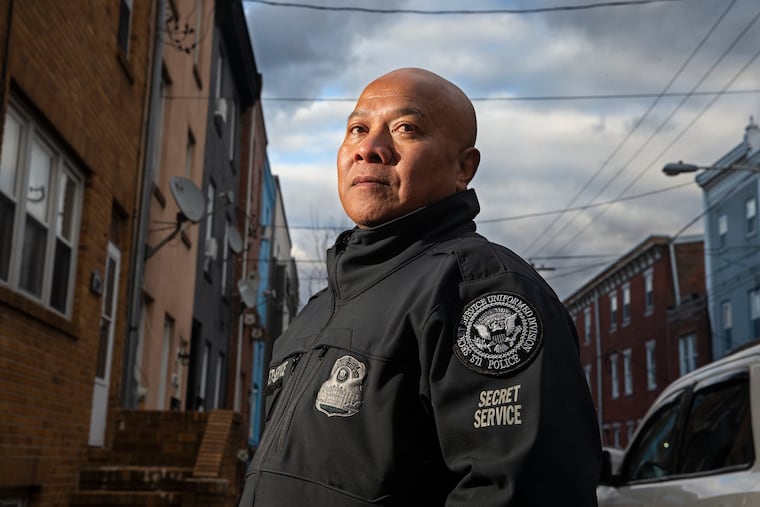From the Killing Fields to the Secret Service, via Philadelphia: a Cambodian refugee carves his American dream
"If I can survive those things there’s nothing I can’t do," Leth Oun said, looking back at his long journey.

Leth Oun was 9 when the Khmer Rouge killed his father and rousted his mother, his sister, and him from their home. They were force-marched to slave labor in what became Cambodia’s infamous Killing Fields. All he managed to bring along was Dino, his little French bulldog, proof of goodness still in the world.
But one night, he returned from his toil, and found Dino in a pool of blood. The soldiers had killed him just because they could. He buried Dino with his bare hands. A piece of his heart went with it. He didn’t dare cry.
Almost 40 years later, Leth Oun was on a plane, another dog by his side. Reik, strong and true, like the man Oun had become. They were like brothers, and partners on an important mission as part of the U.S. Secret Service detail protecting President Barack Obama on the first visit by an American president to Cambodia. In fact, Oun was the first Cambodian accepted into the Secret Service.
That one person could go from a little boy too afraid to show fear to a man who protects presidents is an incredible journey by anyone’s standards.
For Oun, a crucial part of that journey, the chapter that made the rest of his American story possible were the years he spent in Philadelphia.
”Absolutely, Philadelphia is where it all started,” said Oun, 56. “That’s where my foundation’s at. It helped me, supported me to find the future I have today.”
Oun tells thestory of his remarkable life in A Refugee’s American Dream: From the Killing Fields of Cambodia to the U.S. Secret Service, a memoir published earlier this month that he wrote with novelist and journalist Joe Samuel Starnes.
Oun will discuss his story at 7:30 p.m. Feb. 28 at Philadelphia Free Library, as well as at 2 p.m. March 1 at Temple University Library and 7 p.m. March 22 at Tredyffrin Library.
A Refugee’s American Dream recounts his family’s hellish ordeal when the Khmer Rouge, an extremist communist regime, seized control of Cambodia in April 1975 through 1979. An estimated 1.7 million to 3 million people died from execution, starvation, or disease out of a population of about 8 million.
Oun writes of working hours on end in rice paddies with almost nothing to eat. He hunted rats to keep from starving. He was tortured.
“I’m not going to die today,” became his daily mantra.
His family lived in refugee camps and then came to the United States, when he was 17. For the first 11 years, they lived in Maryland. Oun struggled to learn English, continue his education, and work many jobs. While working in a mini-mart, he became friendly with Secret Service agents who encouraged him to apply. He also met Sophy, a Cambodian refugee who became his wife and had Philadelphia ties.
In 1994, the Ouns moved to the 1500 block of South Sixth Street in Philadelphia. Sophy’s relatives found them jobs, and Leth entered Community College of Philadelphia.
Oun’s mother, Sin Chhoeum, found peace in Philadelphia. Unlike in Maryland, here there were many Cambodians she could speak with, Asian markets to shop in, and a Cambodian Buddhist wat where she could worship.
Seeing his mother feel at home again meant a great deal to Oun.
Meanwhile, Oun hammered away at his goals. He worked multiple jobs and slept little, as he dreamt of a career in law enforcement. Finally, at age 30, he entered Widener University to study sociology.
Even now, professors clearly recall their determined student.
“He was really dedicated to learning,” said sociologist and retired professor Vernon Smith. “He wasn’t a screwing around kind of guy. He was on a mission.”
“Leth was an amazing person. He increased the value of my classes by his presence,” said Barbara Ryan, a former chair of the sociology department.
When Oun graduated in 1998, she said, he was given the department’s top honor even though his wasn’t the highest GPA. “We gave him that award because of his heart.”
His first job was as a social worker. Oun and Sophy had two children by then and were quite happy in their Philadelphia life, with many friends and family nearby.
But Oun, always striving, still had hopes about the Secret Service. He applied and waited. Finally an acceptance letter came.
Leaving Philadelphia for all of them was hard but necessary for his new job. His first assignment was guarding Vice President Dick Cheney and his family. Before long, he was called into a supervisor’s office and asked if he liked dogs.
“I love dogs,” he said.
Oun was reassigned to the K-9 division. That’s how he and Reik, a Belgian Malinois skilled at bomb detection, began their long, close partnership. Reik even learned Khmer. Like family, Reik retired to the Ouns’ home and lived to 16. Oun misses him still.
Philadelphia remains special to Oun. When he visits, people shake his hand. Some of the younger ones call him “uncle,” out of affection and respect. The local Asian American Chamber of Commerce has invited him to speak at its Asian Heritage Month events.
The book, for him, is a dream come true. He plans for proceeds to go to the Leth Oun Cambodia Relief Fund to pay for educational programs for Cambodian people who can’t afford them. He wants those children to believe their dreams are possible, too.
“All the things that happened to me,” he said. “I think if I can survive those things, there’s nothing that I can’t do.”